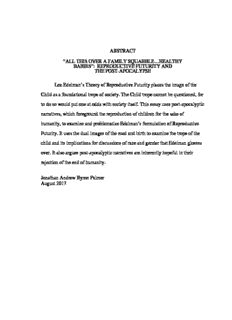Table Of ContentABSTRACT
“ALL THIS OVER A FAMILY SQUABBLE…HEALTHY
BABIES”: REPRODUCTIVE FUTURITY AND
THE POST-APOCALYPSE
Lee Edelman’s Theory of Reproductive Futurity places the image of the
Child as a foundational trope of society. The Child trope cannot be questioned, for
to do so would put one at odds with society itself. This essay uses post-apocalyptic
narratives, which foreground the reproduction of children for the sake of
humanity, to examine and problematize Edelman’s formulation of Reproductive
Futurity. It uses the dual images of the road and birth to examine the trope of the
child and its implications for discussions of race and gender that Edelman glosses
over. It also argues post-apocalyptic narratives are inherently hopeful in their
rejection of the end of humanity.
Jonathan Andrew Byron Palmer
August 2017
“ALL THIS OVER A FAMILY SQUABBLE…HEALTHY
BABIES”: REPRODUCTIVE FUTURITY AND
THE POST-APOCALYPSE
by
Jonathan Andrew Byron Palmer
A thesis
submitted in partial
fulfillment of the requirements for the degree of
Master of Arts in English
in the College of Arts & Humanities
California State University, Fresno
August 2017
© 2017 Jonathan Andrew Byron Palmer
APPROVED
For the Department of English:
We, the undersigned, certify that the thesis of the following student
meets the required standards of scholarship, format, and style of the
university and the student's graduate degree program for the
awarding of the master's degree.
Jonathan Andrew Byron Palmer
Thesis Author
John Beynon (Chair) English
Alison Mandaville English
Melanie Hernandez English
For the University Graduate Committee:
Dean, Division of Graduate Studies
AUTHORIZATION FOR REPRODUCTION
OF MASTER’S THESIS
x I grant permission for the reproduction of this thesis in part or in
its entirety without further authorization from me, on the
condition that the person or agency requesting reproduction
absorbs the cost and provides proper acknowledgment of
authorship.
Permission to reproduce this thesis in part or in its entirety must
be obtained from me.
Signature of thesis author:
ACKNOWLEDGMENTS
I would like to thank Melanie Hernandez, Alison Mandaville and John
Beynon for their guidance in this endeavor. I would also like to thank my parents
Byron and Pam Palmer as well as my siblings Heather and Jamie who supported
me even in the tough times. Lastly, I want to thank my wife Shelly who believed
in me, even when I did not. Thank you.
TABLE OF CONTENTS
Page
LIST OF FIGURES ................................................................................................ vii
CHAPTER 1: INTRODUCTION ............................................................................ 1
CHAPTER 2: THE FIRST LAST MAN ................................................................ 12
CHAPTER 3: ROAD TO BIRTH .......................................................................... 24
The Fury Road and The Redemption of Hope ................................................ 28
Raising a Child on The Road: Alienation of Father and Son .......................... 35
Child of the Road: The Ark of Art and Checkpoints ...................................... 40
CHAPTER 4: BIRTH ON THE ROAD ................................................................. 45
Splendid’s Sacrifice: The Return of the Green Place ..................................... 47
Child of Kee: Refuge and the Refugee ........................................................... 53
Motherhood and The Alien Child ................................................................... 57
CHAPTER 5: CONCLUSION ............................................................................... 63
WORKS CITED ..................................................................................................... 67
LIST OF FIGURES
Page
Figure 1. Chyikowski, Peter. A two-sentence summary of every episode of The
Walking Dead .......................................................................................... 46
CHAPTER 1: INTRODUCTION
On March 23, 2016, The North Carolina state legislature passed HB2, a
measure blocking local municipalities from passing anti-discrimination laws
designed to protect gay and transgender rights. The law, largely aimed at a
measure passed by the city of Charlotte the previous month, was dubbed a
bathroom bill and consequently was particularly strident on the use of bathrooms
by transgendered individuals: effectively barring them from using gendered
restrooms other than the gender assigned at birth. One of the chief arguments for
North Carolina’s statute has been the need to protect young girls from predatory
men who would do them harm and stand behind the protections supposedly
granted by Charlotte’s transgender anti-discrimination policy. The bill led
prominent businesses threatening to pull out of North Carolina including the
NCAA. On March 30, 2017, portions of the bill were repealed in a compromise
that did away with the requirement that transgender individuals use the bathroom
of the gender they were assigned at birth. The prohibition on local municipalities
passing anti-discrimination laws was kept in place however it was made
temporary. Despite the backlash against North Carolina similar bills have popped
up in other conservative-led states such as Texas and Arkansas.
Much of the ink spilled in defense of the North Carolina legislature who
passed this bill to supersede Charlotte revolves around that pathetic, cherubic, and
innocent symbol of the girl who needs protection from the boogeyman in women’s
clothing. The argument against anti-discrimination willfully and flagrantly places
the value of the image of a child versus the transgendered at any age. Lee Edelman
ties this political image of the child to a structure of society around the futurity of
children: namely that the imagined production of children creates and guarantees
Description:argue that it has more in common with an apocalyptic narrative, as it ends with .. something that fills the vacated space that's left by what used to be .. community and his deep, warranted suspicion of the world around him is Channeling Stacker Pentecost's (Idris Elba) memorable exhortation to th

